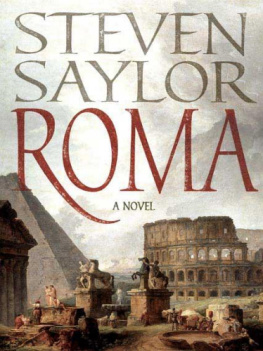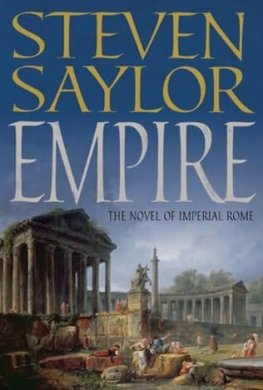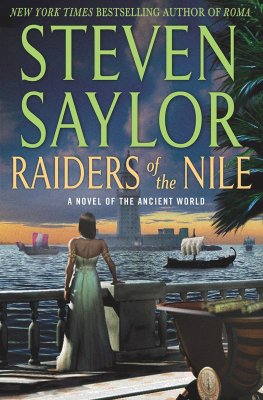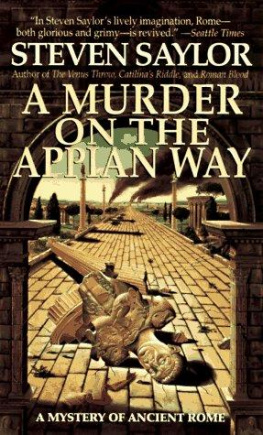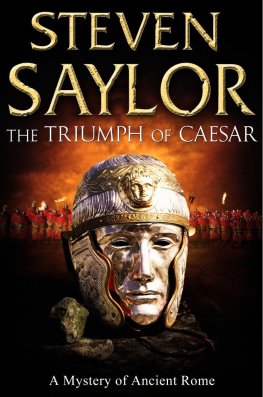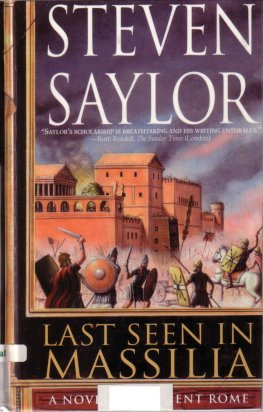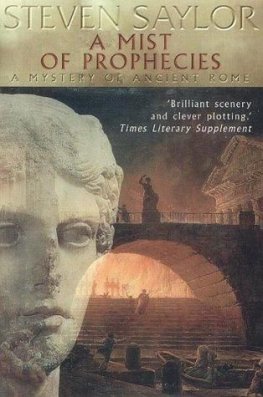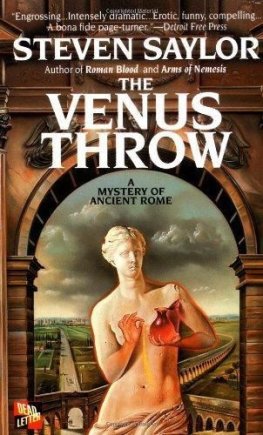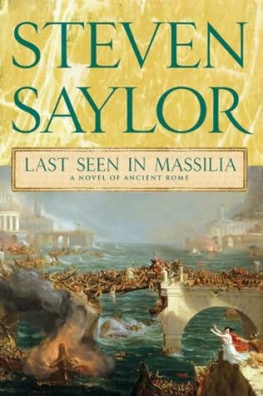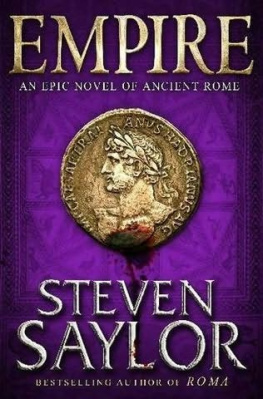Steven Saylor - Roma
Here you can read online Steven Saylor - Roma full text of the book (entire story) in english for free. Download pdf and epub, get meaning, cover and reviews about this ebook. year: 2011, publisher: St. Martins Griffin, genre: History. Description of the work, (preface) as well as reviews are available. Best literature library LitArk.com created for fans of good reading and offers a wide selection of genres:
Romance novel
Science fiction
Adventure
Detective
Science
History
Home and family
Prose
Art
Politics
Computer
Non-fiction
Religion
Business
Children
Humor
Choose a favorite category and find really read worthwhile books. Enjoy immersion in the world of imagination, feel the emotions of the characters or learn something new for yourself, make an fascinating discovery.
- Book:Roma
- Author:
- Publisher:St. Martins Griffin
- Genre:
- Year:2011
- Rating:3 / 5
- Favourites:Add to favourites
- Your mark:
- 60
- 1
- 2
- 3
- 4
- 5
Roma: summary, description and annotation
We offer to read an annotation, description, summary or preface (depends on what the author of the book "Roma" wrote himself). If you haven't found the necessary information about the book — write in the comments, we will try to find it.
Roma — read online for free the complete book (whole text) full work
Below is the text of the book, divided by pages. System saving the place of the last page read, allows you to conveniently read the book "Roma" online for free, without having to search again every time where you left off. Put a bookmark, and you can go to the page where you finished reading at any time.
Font size:
Interval:
Bookmark:
ROMA
STEVEN SAYLOR
To the shade of Titus Livius,known in English as Livy,
who preserved for us
the earliest tales
of earliest Rome


The twelve-year-old boy sat cross-legged on the floor, reciting his lessons. His grandfather sat before him on a simple wooden folding chair with bronze hinges. Despite the fact that the chair had no back, the old man sat rigidly erect, setting an example for the boy.
Now tell me, Titus, upon what day did King Romulus depart from this earth?
Upon the Nones of Quinctilis, two hundred and six years ago.
How old was he?
Fifty-five.
And where did this occur?
At the Altar of Vulcan that stands before the Goats Marsh, at the western end of the Field of Mars.
Ah, yes, but was it called the Field of Mars in those days?
The boy frowned. Then, remembering what he had been taught, his face brightened. No, grandfather. In King Romuluss day, people called it the Field of Mavors, because thats what they called Mars in olden timesMavors.
And what do we learn from this example?
That words and names can change over timethey usually grow shorter and simplerbut that the gods are eternal.
The old man smiled. Very good! Now, describe the ascension of King Romulus.
There was an eclipse of the sun and also a great storm, and the people fled in fear. Thats why the festival each year held on that day is called the Populifugia, the flight of the people. But one man, an ancestor of the Pinarii, remained. His name was just Pinarius; back then, most people only had one name, not two, as we do now. Pinarius witnessed the miracle that occurred. The sky opened and a funnel-shaped whirlwind came down. It was the hand of Jupiter, and it lifted King Romulus into the sky. Before he left, the king removed his iron crown and placed it on the Altar of Vulcan, for his successor. Thus King Romulus became the only man in all history who never died. He simply left the earth, to go live as a god among the gods.
Very good, Titus! Youve been studying hard, havent you?
Yes, grandfather. Pleased with himself, young Titus Potitius reached up and touched the amulet of Fascinus that hung from a gold chain around his neck. His father had given it to him at the last Feast of Hercules, when Titus had assisted for the first time as a priest at the altar.
Now tell me: who were the kings who followed Romulus, and what were their greatest achievements?
King Romulus had no son, so after he departed, the senators met and debated who should succeed him. This set a precedent that would be followed forever after, that the succession of the kings is not hereditary; instead, a king is chosen, to serve for life, by the Senate. They chose Numa Pompilius, a man of Sabine blood who had never even set foot in Roma. This set another wise precedentthat the new king could be an outsider, and should not come from the ranks of the Senate, else the senators might fight among themselves to seize the crown. The reign of Numa was long and peaceful. He was very pious, and he did much to organize the colleges of priests and the worship of the gods.
Then came Tullus Hostilius. He was as warlike as Numa had been peaceable. By destroying her rivals, he made Roma the chief city of all the Latin-speaking people of Italy. Tullus Hostilius built the great assembly hall in the Forum where the Senate meets.
Then came Ancus Marcius, who was Numas grandson. He built the first bridge across the Tiber. He also founded the city of Ostia at the mouth of the river, to serve as a seaport for Roma.
The fifth king was the first King Tarquinius. He was of Greek blood but came from the Etruscan city of Tarquinia, from which he took his name. He was both a great warrior and a great builder. He constructed the great underground sewer, the Cloaca Maxima, that follows the ancient course of the Spinon and drains the Forum. He laid out the great horseracing track in the long valley between the Palatine and the Aventine, which we call the Circus Maximus, and built the first viewing stands. And he drew up the plans and began the foundations for the greatest building ever conceived anywhere on earth, the new Temple of Jupiter on the Capitoline Hill.
Titus rose from the floor and strode to the window, where the shutters were open to let in the warm breeze. The house of the Potitii was situated high on the Palatine, so that the window afforded a splendid view of the massive construction project on the neighboring Capitoline Hill. Surrounded by scaffolds swarming with artisans and laborers, the new temple had begun to take shape. It was of an Etruscan design called araeostyle, with a broad, decorated pediment set atop widely spaced columns and a single grand entrance from the recessed porch. Titus gazed at the sight, fascinated.
His grandfather, ever the pedagogue, prompted a digression. Was the hill always called the Capitoline?
No. Since the days of King Romulus it was called Asylum Hill, but now people have started calling it the CapitolineHead Hill.
And why is that?
Because of the amazing thing the diggers found when they started work on the new temple foundations, back in the reign of the first King Tarquinius. They uncovered the head of man, which appeared to be very ancient but was remarkably well preserved. The priests called it a sign from the gods, and a most excellent one, portending that Roma would become the head of the world. Titus frowned. How could such a thing have happened, grandfather? Who would have buried a head with no body on the Capitoline, and how was it preserved?
The old man cleared his throat. There are mysteries which no man can explain, which are nonetheless true, for tradition tells us so. If you doubt the veracity of the tale, I can assure that I myself, as a young man, was privileged to see the head not long after it was found. The mans features were somewhat decayed, but one could see very clearly that his hair was blond, mixed with gray, as was his beard.
He sounds like you, grandfather.
The old man raised an eyebrow. Im not as far gone as that! Now, back to the list of the kings. After the first Tarquinius
The first Tarquinius was succeeded by Servius Tullius. He had been a slave in the royal household, but he rose to such prominence that when Tarquinius died, he was put forward by Tarquiniuss widow to succeed him. He greatly reinforced and extended the fortifications of the city until all the Seven Hills were enclosed by pickets, walls, embankments, and trenches. He also excavated the underground cell in the state prison at the foot of the Capitoline, which we call the Tullianum, where the enemies of the king are executed by strangulation. He put these projects first, so that work on the new temple came to a standstill.
And after Servius Tullius comes the present king, the son of Tarquinius, also named Tarquinius. Our king is famous for acquiring the Sibylline Books, which are full of prophecies that guide the people in times of crisis.
And how did that come about?
Titus smiled, for this was one of his favorite stories. The Sibyl lives in a cave down in Cumae, on the coast. The god Apollo compelled her to write hundreds of strange verses on palm leaves. She stitched together all the palm leaves into nine scrolls, which she brought to Roma and offered to sell to King Tarquinius, saying that if a man could interpret her verses rightly, he could foretell the future. Tarquinius was tempted, but he told her that the price was too steep, whereupon she waved her hand and three of the scrolls burst into flames. Then she offered to sell him the remaining sixfor the original asking price of the nine! Tarquinius was angry and again refused, whereupon the Sibyl burned three more scrolls, then named the same price once again. King Tarquinius, thinking of all the knowledge that had already been lost, gave in. He paid the price she had asked for nine books and got only three. The Sibylline Books are very sacred. They must be consulted only in the direst emergency. To house them, Tarquinius set about completing the great temple which his father began.
Next pageFont size:
Interval:
Bookmark:
Similar books «Roma»
Look at similar books to Roma. We have selected literature similar in name and meaning in the hope of providing readers with more options to find new, interesting, not yet read works.
Discussion, reviews of the book Roma and just readers' own opinions. Leave your comments, write what you think about the work, its meaning or the main characters. Specify what exactly you liked and what you didn't like, and why you think so.

